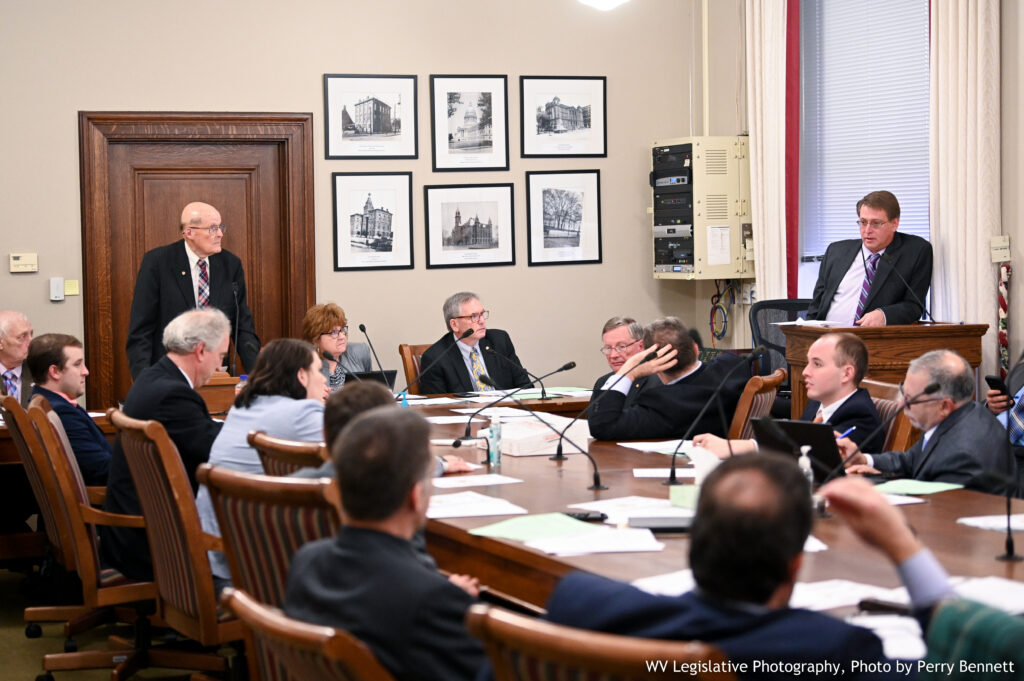MORGANTOWN — The House and Senate energy committees took up complex natural gas-related bills on Tuesday. Senate Energy handled a bill pitting mineral owners against producers and after long debate put it aside for more haggling.
House Energy took up a tax credit bill intended to promote an Appalachian Storage Hub that dropped some jaws with its potential budget hole and passed a slimmed down version.
Senate mineral lease bill
SB 554 is a scaled down version of last year’s HB 2866, which passed the House and died in Senate Judiciary. It aimed to allow mineral owners to gain release from inactive leases so they could sign new ones. It set up a notification process leading to an affidavit of termination.
Mineral owners explained last year that sometimes producers stop producing wells but don’t release the leases, prohibiting the owner from signing a new lease to generate income. This bill would have helped them get their minerals back into production.
SB 554 requires a company (the lessee) to provide notice of lease termination to the mineral owner (lessor) within 30 days. Failing that, the lessor may serve notice to the lessee and then file an affidavit of termination at the county courthouse. Various details are spelled out.
Thomas O’Neal, representing the West Virginia Oil and Natural Gas Association, said WVONGA opposes the bill for several reasons. One, it would allow one party in a contract, the lessor, to declare the contract terminated.
Two, WVONGA members have thousands of leases, some with unknown or unlocateable owners, and if all the lessors, with real or bogus claims, filed notice, WVONGA would be overwhelmed. Current law allows lessors to file suit to terminate leases and in clear-cut cases, it’s not that expensive.
Last year’s bill, he said, had some protections for lessees that he hoped would be restored in this bill.
Valerie Antonette, vice president of Bounty Minerals Management and President of National Association of Royalty Owners Appalachia, said the bill is not designed to cancel leases in effect or overwhelm WVONGA members with a flood of notices. It deals with single lessors.
The bill, she said, imposes a duty on operators to send notice on leases that have canceled on their own terms through inactivity. Many old leases and some modern ones contain no termination provisions.
There have been cases where lessors contact the producers, who don’t respond or who deny termination, she said. And sometimes the producer is out of business and this bill would allow the lessors to obtain clear title for future use.
Sen. Doug Facemire, D-Braxton, didn’t buy many of O’Neal’s arguments. Many people can’t afford to take court action, he said. “I don’t really see where this is such a big deal.”
Facemire suggested that the committee lay the bill over to give WVONGA 48 hours to negotiate adjustments to the bill. O’Neal said he couldn’t speak for WVONG that they could come up with agreeable language that fast. Facemire said, in effect, take the offer or they’d pass the bill now.
O’Neal agreed and they laid the bill over unit Thursday.
Tax credit bill
HB 4421 is called the Natural Gas Liquids Economic Development Act. To promote development of the petrochemical industry, it proposed to provide three types of tax credits: personal income tax, corporate net income tax or severance tax. It allowed certain carry-forward and transfer provisions.

The sticking point was a fiscal note form the state Tax Department that said the definition of eligible taxpayers was so broad – “any natural gas liquids producer, natural gas liquids storer, natural gas liquids user or natural gas liquids transporter” – that the bill could put a $400 million hole in the state budget.
In view of the Tax Department’s alarm, the House Energy Committee worked up a committee substitute bill that limits the credit to those that store or transport natural gas liquids. The credit applies only to personal income and corporate net taxes.
The Tax Department will have to work up a new fiscal note based on that limitation.
Support and objection fell mostly along party lines, with Democrats expressing various concerns. The amended bill passed in a 12-9 roll call vote and heads to House Finance for further work. Finance chair Eric Householder, R-Berkeley, is lead sponsor of the introduced version.
Tweet David Beard @dbeardtdp Email dbeard@dominionpost.com




